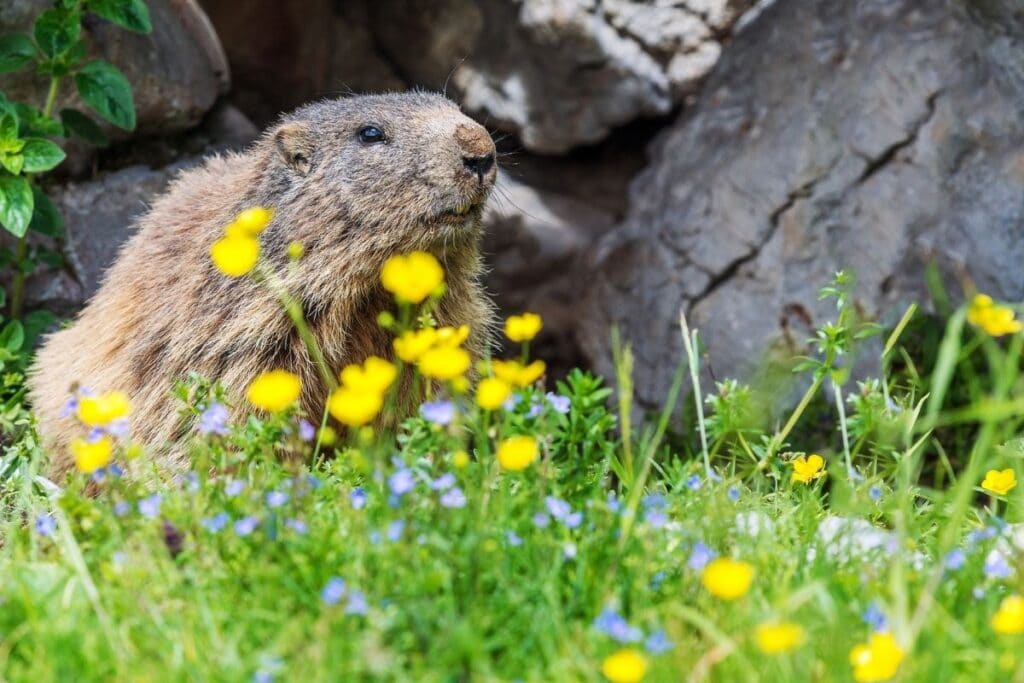Want to know how to keep groundhogs out of the garden? We have all the tips you need!
Even though groundhogs are cute and cuddly, they can do some serious damage to your garden especially if you’ve freshly grown fruits and veggies. There are many safe ways to ward off these fuzzy creatures and keep your garden safe from their hungry paws.
From motion censored devices, and littering offensive scents to their small noses, to blocking their burrows completely, there are many effective methods to prevent groundhogs from digging holes in your yard and eating your vegetables.
We have created a simple, full-proof guide of methods to try when keeping groundhogs away from your property. Read on to learn more specifics about groundhog prevention.
How To Stop Groundhogs From Eating My Plants
Even though groundhogs hibernate during the cold months of winter, they can be invasive as they burrow underground in the warmer months and come out during the cool of the day to feast on vegetables or tasty flowers.
These critters have a big appetite as they are one of the larger relatives in the squirrel family. Coming in anywhere between 4 to 14 pounds, groundhogs will pursue your delicious-looking garden with intense persistence.
Don’t worry, here are a few preventative measures to take when stopping those critters from eating your garden.
What Do Groundhogs Hate?
Offensive Smells
With this method, you can potentially kill two birds with one stone. Strong scents often deter critters like groundhogs and ground squirrels as well as creatures such as deer and your neighborhood cats.
A groundhog’s nose is extremely sensitive since they have more smell receptors than humans. What is often a pleasant aroma for us is overwhelming for a groundhog’s nostrils. Here are a few items with strong scents to deter groundhogs.
Blood Meal
Blood meal is essentially dried animal blood that contributes a wonderful nitrogen amendment you can add to your garden. In other words, not only does the smell ward off groundhogs, but it can help your garden prosper!
This smell is not offensive to us, but it is extremely tangy and metallic to a groundhog. In addition, they are relatively shy of another wild animal even if they are not predators. Therefore, the smell of dried animal blood will help ward groundhogs off.
Hot Peppers & Garlic
Both of these food items not only have an extremely strong smell but a strong taste too. One of the most effective methods of dispersing these foods around your garden is to puree them and dilute them in water to then spray them around your yard.
Black Pepper
If you’re short on other supplies and need a quick fix, consider grinding pepper around your garden! Much like how black pepper disturbs our nostrils (a.k.a sneezing), black pepper has a similar effect.
Predator Urine
Because groundhogs are among some of the shiest animals, they will go running if they smell predator urine on your property.
Strong-Smelling Herbs
Herbs such as lavender, chives, mint, thyme, basil, and lemon balm all have strong smells that are too much for groundhogs. You can plant them near your garden and around where you notice their burrows popping up.
Plugging Up Burrows
If you start noticing piles of soft soil in your yard, that most likely means that a groundhog has burrowed its way onto your property. Finding ways to plug up their burrows is one of the most effective ways to discourage them from coming into your yard.
Urine-Soaked Kitty Litter
We know this may sound unpleasant, but it works! If you have a house cat, don’t throw out the litter just yet! All you have to do is take some of the dirty litter and place it just inside the opening of the burrow. The pungent smell should send the groundhogs running.
Make sure to lightly seal the burrow by shoveling some loose dirt over it so the smell stays in the burrow.
Bury a Barricade
Groundhogs are always looking for vacant barricades and that can cause problems for your garden. If you notice a burrow, take a good-sized block of welded wire (about 3 feet) to bury it in the burrow entrance.
Fencing
Wire fencing works best since it will need to be bent to prevent groundhogs from digging under the fence and toward your gardens. These critters can climb so the fence needs to be at least four feet high above the ground and two feet deep underground.
That being said, before you bury the fence, the bottom 12 inches need to be bent at a 90-degree angle away from your garden to prevent groundhogs from getting through.
Scare Groundhogs Away
You don’t have to put on a Halloween mask to frighten groundhogs, but you can set up small triggers that make a lot of noise when they are tripped. For example, you can place bells on wires around their burrows and your garden.
Or, you can use motion-activated devices such as sprinklers or flashing lights. Many motion-activated tools mimic a predator’s eyes which will work great.
Additionally, since they dig underground, you can create vibrations to disturb their resting places. You can do this by placing spinning pinwheels around your garden or their burrows or purchasing a sonic vibration machine.
What is a Natural Way to Get Rid of Groundhogs?
If you prefer to use natural deterrent methods, there are many you can try.
Herbs & Food Products
As stated previously, using offensive, strong-smelling scents will help deter these animals from your garden.
You can plant lavender, mint, thyme, and many more herbs around the burrow or simply harvest the herbs and gently lay them within the burrow. Again, make sure to lightly cover the opening so the smell gets trapped in there.
Additionally, keep in mind that hot peppers are your friend! Cayenne peppers seem to work best. You can even buy them in bulk! You can pour them straight from the container into or near the burrow and the groundhogs should stay away.
Garlic combined with hot peppers is a great method as well, but you can just use garlic if you wish. You can mince the garlic and press it to make a paste. This paste can be smeared on fence posts, soil, and around the burrow.
Human Hair
If you need to get rid of the hair in your hairbrush or need to dispose of fresh clippings, you can use that hair to deter groundhogs.
These critters usually detest the smell of humans. Therefore, keeping your scent present in your garden will help keep them away.
Castor Oil
This oil is another scent that groundhogs hate. You can pour a small amount in and around their burrow to keep them away.
Keep Up With the Garden
If you have a vegetable garden, it is best to harvest them right away if you have a groundhog problem. Reducing their food supply is a good way to frustrate them and encourage them to look for a food source somewhere else.
That being said, it will also be worthwhile to get rid of any “hiding places” that may be in your garden. In other words, pesky groundhogs will use tall weeds, tall grass, thickets, brush piles, woodchips, and other debris to hide. Make sure to clean these up to discourage burrowing and avoid attracting groundhogs.
Does Irish Spring Soap Keep Groundhogs Away?
Irish Spring soap is a great groundhog repellent. It is recommended that you keep the soap in the packaging but drill holes in it so the rain and other elements don’t wash away the soap so easily.
If you want to use Irish Spring Soap, make sure to keep an eye on its scent integrity and replace it after heavy rain.
Will Vinegar Keep Groundhogs Away?
Vinegar will help keep groundhogs away and there are a few methods to administer vinegar.
One way to do it is to dilute vinegar in some water. You can take half parts water and half parts vinegar and put it in a spray bottle to spray around your yard.
You can also leave small bowls of vinegar around your garden for a more potent smell.
Will Mothballs Keep Groundhogs Away?
Mothballs will also keep groundhogs away, but we don’t recommend it if you have small children and pets. This element is meant to be used in a tightly closed container as it includes chemicals that can be harmful if ingested in large amounts.
How to Keep Groundhogs Out of Raised Beds
Some of the best methods to keep groundhogs out of raised beds are chicken wire, wind chimes, and humane relocation.
Chicken Wire
As stated previously, fencing is a great method to keep woodchucks out of the garden. If your raised beds are being invaded, create a tall barrier with chicken wire. You can even double up on the chicken wire!
Wind Chimes
If you have some wind chimes hanging around, you might want to consider moving them above your raised garden bed. The noise of the wind chimes will help scare the groundhogs off.
Humane Relocation to Control Groundhogs
Sometimes, there is only so much you can do before having to physically relocate groundhogs.
You can safely trap them by luring them with some of their favorite snacks such as broccoli or squash and bring them to a professional.
If you don’t feel comfortable catching them by yourself using groundhog traps, call your local animal control, wildlife control, groundhog removal service, or pest control specialist who will safely remove and relocate the groundhogs away from your property.
How to Get Rid of Groundhog Burrows
It is best to get rid of all areas that are habitable for ground hogs. In other words, you must plug up their burrows.
A good way to do this is to place that urine-soaked kitty litter or another offensive-smelling ingredient in the entrance of the groundhog hole then lightly cover it with soil. Make sure the ground hog is out of its burrow before doing this. Otherwise, it will remain in the burrow.
Choosing The Best Groundhog Repellent
Garden groundhogs may be cute, but they will destroy your garden if you don’t take preventative measures.
One of the most effective ways to discourage groundhogs from eating your garden is to take advantage of offensive smells. Plant herbs like mint, thyme, basil, and others around your garden to repel groundhogs. Or, you can place the herbs themselves right in the burrow.
Additionally, you can consult a professional to safely remove and relocate the groundhogs well away from your property.
Don’t be afraid to try a combination of these methods to get rid of whistle pigs. Take time to figure out what works best for you and your garden!
FAQs
What do groundhogs hate the most?
Groundhogs dislike strong, pungent smells such as garlic, pepper, and ammonia. These odors can help deter them from specific areas or discourage unwanted behaviors.
What scent will keep groundhogs away?
Scents like garlic, peppermint, or castor oil are known to repel groundhogs. These scents can be applied to areas you want to protect or used in combination with physical barriers to discourage groundhogs from accessing certain areas.
How do I keep groundhogs from eating my plants?
To keep groundhogs from eating your plants, consider using physical barriers such as fencing or netting to protect vulnerable areas of your garden. Additionally, planting less palatable or aromatic plants around your garden perimeter can help deter groundhogs.
Will a groundhog eat my garden?
Groundhogs are herbivores and will eat a variety of plants, including vegetables, fruits, flowers, and ornamental plants. They can cause significant damage to gardens and landscapes if left unchecked, so it’s important to take steps to protect your plants from groundhog feeding behavior.
What is a homemade groundhog repellent?
A homemade groundhog repellent can be made using a mixture of water, cayenne pepper, and dish soap. Mix these ingredients and spray the solution around areas where groundhogs are active or where you want to protect plants. The spicy scent of the cayenne pepper combined with the soap’s adhesive properties can deter groundhogs from entering or feeding in treated areas.
See more: How to prevent moles in yard
*image by PantherMediaSeller/depositphotos







